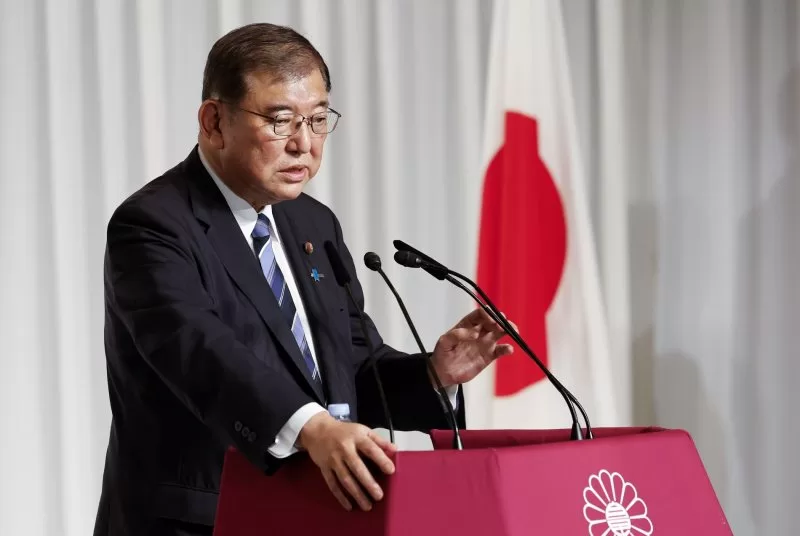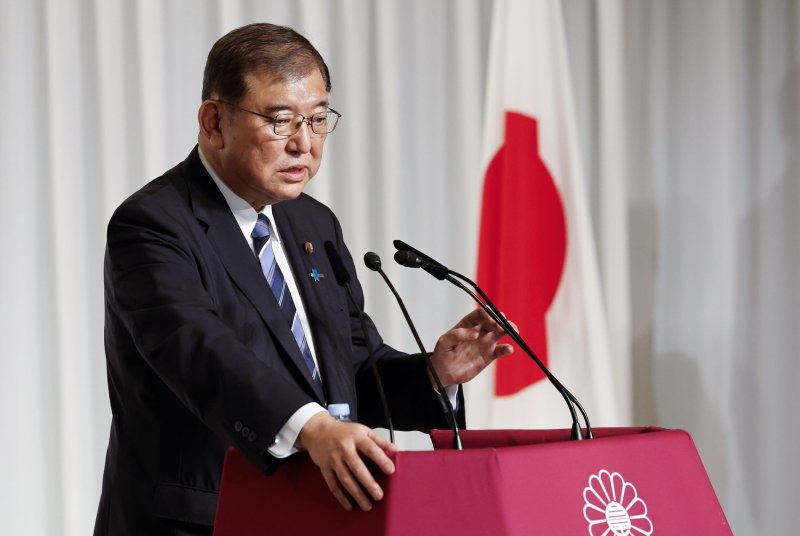Newly elected leader of Japan’s ruling party, the Liberal Democratic Party’s Shigeru Ishiba, holds a press conference after the LDP leadership election, in Tokyo. Ishiba won the Liberal Democratic Party leadership election on 27 September. Pool Photo by Kim Kyung-Hoon/EPA-EFE
Oct. 28 (UPI) — In a significant political upset, Japan’s Liberal Democratic Party coalition failed to secure the 233 seats required to maintain its majority in the country’s lower house in Sunday’s general election.
The result marks one of the largest political upheavals Japan has experienced in 15 years, with the yen falling to a three-month low after the coalition’s loss.
The LDP’s defeat was in large part a reaction to lack of public trust due to a major corruption allegations of misappropriated political donations amounting to nearly $4 million in campaign financing slush funds that involved dozens of LDP party members.
Of those accused, 46 candidates who were involved in the scandal ran in the election. Discontent over economic concerns, particularly rising living costs, also took center stage in the election.
Unlike the United States and other nations where political cycles often divide voters ideologically, Japan’s LDP has held power almost continuously since its formation in 1955.
The party’s dominance has long been a barometer of public sentiment about leadership in Japan.
Traditionally, support for the LDP has been high and resilient even amidst scandals, especially among Japan’s elderly population and rural regions. However, Sunday’s results suggest a shift in voter sentiment, raising the possibility that the party may need to consider significant reforms to regain support.
Voter turnout reached 53.85%, a decrease from the previous election and the third lowest since the end of World War II.
One historic win emerged for women. Of the 465 members elected to the lower house, 73 were women — the highest female representation in Japan’s government to date.
The snap election was called by Prime Minister Shigeru Ishiba, who hoped his recent election would generate enough momentum to maintain the LDP’s majority.
However, the plan backfired. In the immediate aftermath, party members questioned whether Ishiba should resign despite having served less than a month in office.
At a press conference, Ishiba announced he would remain in his position, pledging to avoid a “political vacuum.”
“I want to fulfill my duty by protecting people’s lives and protecting Japan,” Ishiba told reporters.
While the LDP has maintained majority power for decades, it’s not uncommon for Japanese prime ministers to step down after a short tenure due to scandals or low approval ratings, leading to the term “revolving door” prime ministers in Japanese politics.
Before the election, public support for the Cabinet of Prime Minister Shigeru Ishiba stood at 28%, the lowest starting approval rate for any administration since 2000, according to a Jiji Press poll published Oct. 17.
After the election loss, LDP election campaign chairman Shinjiro Koizumi announced his resignation. Koizumi, a recent prime ministerial candidate, is the son of former Prime Minister Junichiro Koizumi.
One of the LDP’s pressing challenges now is to determine whether it and its coalition partner, Komeito, can compromise on policy agendas to invite a third party into the coalition and regain a majority under this new coalition.
These coalition negotiations could have significant implications for Japan and its relationships in the Asia-Pacific region.
The election results also cast uncertainty on Japan’s defense ambitions. Former Prime Minister Fumio Kishida’s administration had set unprecedented goals for Japan’s self-defense forces, pledging to raise defense spending to 2% of Japan’s GDP.
However, the cost of these ambitions and where funds to fuel them would come from drew skepticism from voters.
Japan remains bound by its postwar constitution-the world’s oldest unamended constitution-which prohibits a standing military apart from the Japan Self-Defense Forces. The process for constitutional revision to enable a conventional military would require a two-thirds majority to initiate, a longstanding aim of the LDP.
On the LDP’s official party website, the top section under “Government Pledges 2024” is “Follow The Rules: I will do my best to regain the public’s trust.”
Monday’s results indicate that this trust may not have been regained, and that an era where trust on its own may no longer be enough to guarantee leadership for the LDP.

